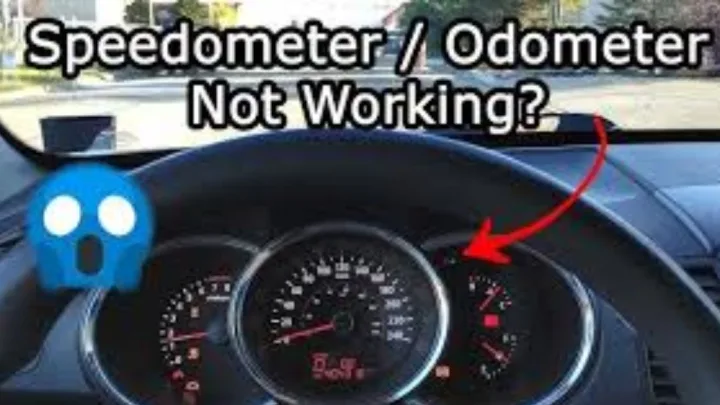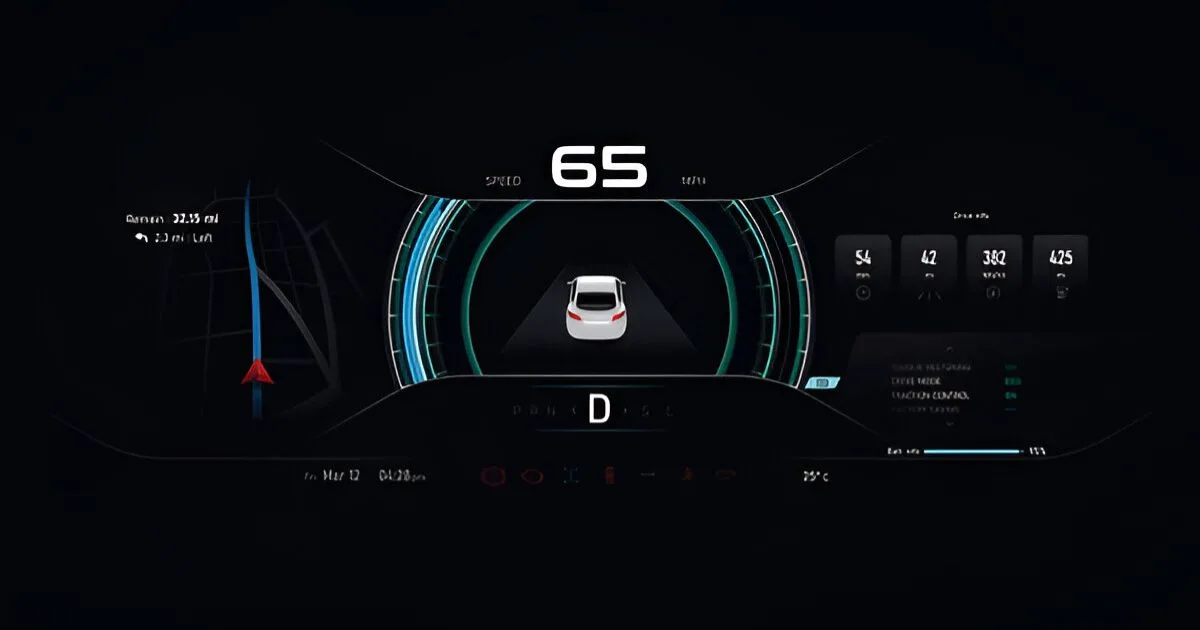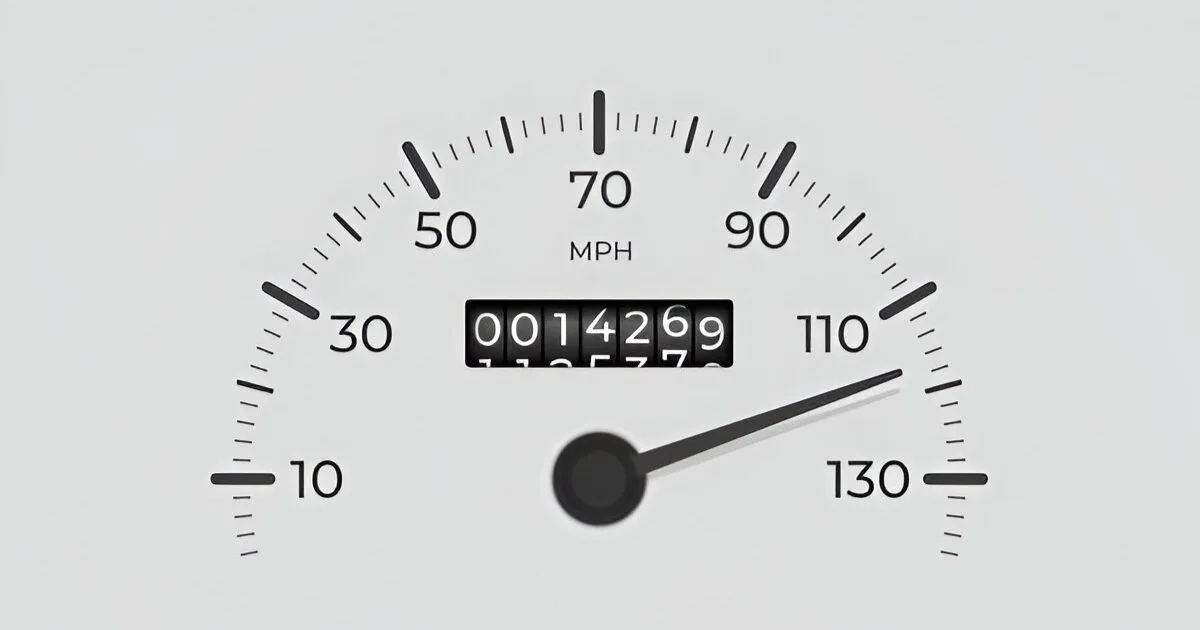
A car speedometer may stop working due to a faulty speed sensor or a broken speedometer cable. Electrical issues or a malfunctioning instrument cluster can also cause failure.
Understanding why a car speedometer ceases to function is crucial for maintaining your vehicle's performance and ensuring safe driving conditions. The speedometer, which displays the vehicle's speed, relies on various components to accurately transmit data. Issues with these components can lead to inaccurate readings or a non-functional speedometer.
Detecting the problem early can prevent further vehicle malfunctions and potential safety hazards on the road. Regular maintenance checks can help identify and rectify speedometer issues before they escalate, saving you time and money on costly repairs. Keep your car's performance in check by staying informed about the common causes of speedometer failure and addressing them promptly.
Introduction To Car Speedometer Issues
A speedometer plays a critical role in driving. It shows how fast you're going. When it stops working, it's not just an inconvenience. It can lead to safety risks and legal troubles. Let's explore what can cause a speedometer to fail and how to spot the signs early.
The Role Of The Speedometer In Vehicle Safety
Speedometers help keep roads safe. They let drivers know their speed. This helps prevent speeding and accidents. A working speedometer is key for safe driving.
Common Symptoms Of Car Speedometer Failure
- Needle doesn't move: It stays at zero while driving.
- Erratic movements: The needle jumps or wobbles.
- Inaccurate readings: The speed shown is wrong.
- Warning lights: Dashboard lights may turn on.
Electrical Problems
Electrical Problems can cause a car's speedometer to stop working. These issues can be tricky. They often need a professional to fix. But understanding them is the first step. Let's look into two main problems.
Faulty Wiring And Connections
Wires connect parts of your car. They send signals. Sometimes, these wires can break or wear out. This can stop the speedometer from getting signals. No signal means no speed reading. It's like when your phone charger stops working because of a bad cable. Your speedometer faces the same issue with faulty wires.
- Check the wires: Look for any visible damage.
- Test connections: Make sure they are tight and clean.
Blown Fuses And Their Impact On Car Speedometer Function
Fuses protect your car's electrical system. They blow if there's too much current. This can happen during a short circuit. If a fuse connected to your speedometer blows, the speedometer will stop working.
- Locate the fuse box: Usually under the dashboard or hood.
- Find the right fuse: Your car's manual can help.
- Check the fuse: A blown fuse looks broken or burned.
- Replace if necessary: Use the same type of fuse.
Both faulty wiring and blown fuses need attention. Ignoring them can lead to bigger problems. Always check these first if your speedometer stops working.
 Vehicle Sensor Malfunctions
Vehicle Sensor Malfunctions
Vehicle Sensor Malfunctions
A car's speedometer is its pulse, showing speed and ensuring safety. When this vital gauge stops working, a common culprit is the vehicle speed sensor (VSS). Let's dive into how this sensor can cause your speedometer to give up its ghost.
The Significance Of The Vehicle Speed Sensor (vss)
The VSS plays a pivotal role in your car's functioning. It measures how fast the wheels spin. This data is crucial for your speedometer to display the correct speed.
Key functions include:
- Fuel management: Adjusts fuel injection for efficiency.
- Gear shifting: Helps automatic transmissions shift at the right times.
- Cruise control: Maintains steady speeds when activated.
If the VSS fails, you might face not just speedometer issues but overall vehicle performance problems.
How Sensor Issues Affect Car Speedometer Accuracy
Sensor malfunctions can lead to inaccurate speedometer readings. This affects your ability to gauge speed correctly, which can be dangerous. Common signs of sensor issues include:
| Sign | Description |
|---|---|
| Erratic needle | The speedometer needle jumps around. |
| Stuck at zero | The needle doesn't move from zero. |
| Check engine light | The dashboard light may come on. |
These symptoms suggest the VSS may need attention. Getting a prompt check-up can prevent further issues.
Instrument Cluster Failures
The instrument cluster is a car's information hub. It displays speed, fuel level, and engine warnings. A malfunction in this system can cause the speedometer to stop working. Let's explore the connection between the cluster and speedometer and how to spot a failing instrument cluster.
The Connection Between The Cluster And Speedometer
The speedometer is part of the instrument cluster. It gets data from the vehicle's computer system. A strong connection is crucial. Wires and circuits link them together. If these connections fail, the speedometer may stop working.
- Wiring issues can disrupt the signal.
- Circuit problems might cause a loss of power.
Signs Of A Failing Instrument Cluster
Several signs indicate a failing instrument cluster. Drivers should be aware of these:
| Sign | Description |
|---|---|
| Erratic Readings | Speedometer gives random, incorrect readings. |
| Complete Failure | Speedometer stops working entirely. |
| Warning Lights | Unexplained lights flash on the dash. |
Other signs include dimming cluster lights and stuck gauges. Immediate attention is needed. A professional can diagnose and fix the problem. This ensures safe and accurate driving.
Physical Damage To The Car Speedometer
Physical Damage to the Speedometer often results from various incidents. Such damage can cause the speedometer to malfunction or stop working altogether. Let's explore the common ways physical damage can impact this crucial car component.
Effects Of Accidents On Car Speedometer Mechanisms
Car accidents can cause severe damage to a vehicle's interior mechanisms, including the speedometer. The impact can dislodge or break the delicate parts that make the speedometer function. Here are some effects:
- Disconnection of cables or gears
- Broken dials or needles
- Cracked speedometer face
Wear And Tear Over Time
Continuous use of a vehicle leads to natural wear and tear. This is true for the speedometer as well. Key components can degrade, affecting the speedometer's accuracy and performance. Factors include:
- Age of the vehicle
- Mileage covered
- Quality of original parts
Regular maintenance is essential to identify and address such issues promptly.
 Programming And Software Glitches
Programming And Software Glitches
Programming And Software Glitches
Car speedometers may fail due to programming issues. These problems are not always visible like mechanical faults. Software controls modern speedometers. Glitches can cause readings to be inaccurate or stop altogether.
Firmware Updates And Their Role In Speedometer Performance
Firmware is a type of software. It allows hardware to communicate with the car's computer system. Manufacturers release firmware updates to improve performance. These updates can fix speedometer issues. They can also optimize the system for better accuracy.
- Updates may add new features.
- They can resolve previous bugs.
- Updates ensure compatibility with other car systems.
Troubleshooting Software-related Speedometer Issues
When a speedometer fails, checking software should be a first step. A professional can diagnose the problem. They can use specialized tools to read error codes. These codes can point to the issue.
- Check for error codes with a diagnostic tool.
- Review recent firmware updates or rollbacks.
- Inspect for software corruption or data loss.
A reset or update might fix the problem. If not, further investigation will be needed. This could include checking connections or hardware.
Aftermarket Modifications Impact
Aftermarket Modifications Impact can be a thrilling way to personalize your car. Yet, these changes might cause your speedometer to stop working properly. Let's explore how modifications can mess up speedometer readings.
How Modifications Can Disrupt Car Speedometer Functionality
Changing parts on your car affects how it measures speed. The speedometer reads the car's speed based on factory settings. When you change these parts, the speedometer might get confused. Here are some examples:
- Engine swaps can change how fast your car communicates with the speedometer.
- Transmission changes might alter the speed data sent to the speedometer.
- Custom software in the car's computer can mislead the speedometer.
Considering The Effects Of Tire And Wheel Changes
Many car owners don't realize that changing tires and wheels can affect the speedometer. Here's why:
| Tire/ Wheel Change | Effect on Speedometer |
|---|---|
| Bigger wheels | Speedometer reads slower than actual speed |
| Smaller wheels | Speedometer reads faster than actual speed |
Always match tire and wheel sizes to your car's specifications. This ensures accurate speedometer readings.
Troubleshooting And Diagnosing Car Speedometer Problems
When a car's speedometer stops working, it can be both puzzling and risky. Without a reliable speedometer, driving at safe speeds becomes challenging. Understanding the common causes and how to troubleshoot them is crucial for any driver.
Steps To Diagnose Speedometer Issues
Diagnosing a faulty speedometer involves a systematic approach. Start with simple checks before moving to more complex diagnostics.
- Check the dashboard for warning lights.
- Inspect the speedometer cable for wear or damage.
- Examine the vehicle's sensors, especially the VSS (Vehicle Speed Sensor).
- Review the car's fuse box for blown fuses.
- Test the instrument cluster's electrical connections.
When To Seek Professional Help
Some speedometer problems require expert attention. If basic troubleshooting doesn't resolve the issue, it's time to consult a technician.
| Issue | Action |
|---|---|
| Dashboard warning lights remain on | Visit a mechanic |
| VSS replacement needed | Seek a professional |
| Complex electrical issues | Use specialized diagnostic tools |
 Preventive Measures And Maintenance Tips
Preventive Measures And Maintenance Tips
Preventive Measures And Maintenance Tips
Keeping your car's speedometer in check is crucial for safe driving. A failing speedometer can cause confusion and potential legal troubles. Regular maintenance and upkeep can prevent such issues. Here are practical tips to maintain your speedometer's health.
Regular Vehicle Maintenance To Prevent Car Speedometer Problems
Proper vehicle care avoids speedometer malfunctions. Here's what you can do:
- Check wiring and fuses regularly.
- Inspect the speed sensor for damage or dirt.
- Review the dashboard for warning lights.
- Consult a professional for electrical tests.
Upkeep Tips For Long-term Speedometer Health
To ensure your speedometer runs smoothly, follow these tips:
- Avoid harsh driving conditions.
- Service your vehicle as per schedule.
- Replace old cables with new ones.
- Keep the dashboard clean and dust-free.
Addressing Car Speedometer Failures
At the end of our journey into speedometer failures, we understand their causes better. Now, let's focus on how to address these issues effectively.
Recap Of Key Causes For Car Speedometer Malfunctions
- Faulty speed sensors: These sensors tell your car's speed.
- Broken wires: Wires connect parts of your car. They can break.
- Bad instrument cluster: This is your car's dashboard. It can fail.
The Importance Of Addressing Car Speedometer Issues Promptly
Fixing speedometer problems is crucial. It keeps you safe on the road. It also makes sure you follow speed laws. Ignoring these issues can lead to accidents or fines.
Always check your speedometer. If it stops working, get it fixed right away. This will help keep you and others safe.
Related Post
What Causes a Car Odometer to Stop Working: Key Reasons
How to Use a Digital Car Manometer: Expert Tips
How Does a Car Ammeter Work: Essential Insights
Conclusion
Understanding the reasons behind a malfunctioning car speedometer is crucial for safe driving and vehicle maintenance. From faulty sensors to damaged wiring, the causes are varied but fixable. Keep your speed in check and address any dashboard warning signs promptly to ensure your speedometer remains a reliable companion on the road.
Disclosure
Some links may be affiliate links. That means we may earn a small commission at no extra cost to you.